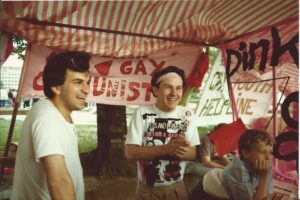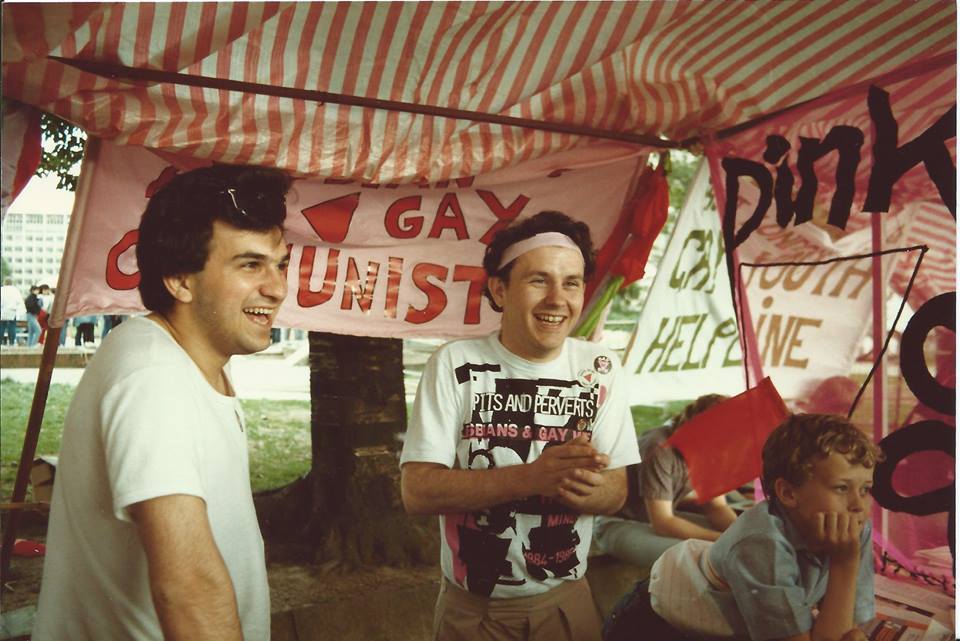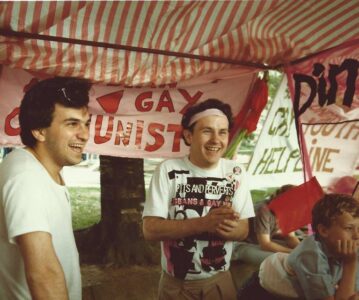Glen Hardie reflects on the way in which the work of communist activist and Lesbians and Gays Support the Miners (LGSM) co-founder Mark Ashton is presented in 2014 film ‘Pride’ and argues that socialists, like the queer community represented by the real LGSM, must be ‘out’: open and explicit about who and what they are.

“You and me together
Fighting for our love”
-Bronski Beat
It’s a June morning in Margret Thatcher’s Britain. A gay man, Mark Ashton, is watching the news over breakfast. Radical posters cover his walls. He’s staring intently at reports of the Tory government’s war with the National Union of Minerworkers (NUM) in their nation-wide strike. Mark’s companion for the previous night is trying to leave his number before he goes but Mark is not listening, he’s staring intently at the news footage of cops and coal miners brawling up and down the picket lines. Mark has been struck by a feeling familiar to any communist organizer, the inspiration needed to seize a political opportunity.
Mark grabs some buckets and practically skips out the door, his neighbor hurls homophobic threats and insults which Mark confidently responds to with jokes. At the Pride parade Mark begins handing out buckets and instructing any queer person who will listen to start using them to collect money for the striking miners. They raise hundreds of pounds in a single day. Thus, Lesbians and Gays Support the Miners (LGSM) is born. With money coming in by the bucketfull the lesbians and gays just need to find some miners to support. But the film’s universe is Thatcher’s arch-reactionary homophobic Britain and these are stereotypically macho miners. LGSM makes call after call to miner’s union offices around the country, only to be rejected again and again, presumably out of a fear that this aid has AIDS. They debate hiding the nature of the group or donating the money anonymously, but Mark is adamant that the point of the project is that it is lesbians and gays publicly supporting the miners. Hiding the fact would defeat the point. Eventually LGSM finds a mining community willing to send a representative to London to pick up the money, thanks in part to a spotty phone connection causing the name of the group to get garbled. The leader in the miner’s union sent up to London to collect the money is taken by surprise when the group turns out to be a gang of gays and lesbians.
Luckily, this leader turns out to have an open mind and quickly warms to the group. What follows is a brilliantly executed dramedy of trading culture shocks. First the Welsh mining community sitting in stunned silence at learning that these lesbians aren’t just vegetarians, they’re vegans. Similarly the members of LGSM are aghast when they find out that Welsh men don’t dance. But after a frosty first meeting these two groups slowly warm to one another and become fast friends. The money that LGSM raises serves as the largest and most consistent support the village receives for everything from food, clothes, to an LGSM-branded van used to bring strikers to the picket line and deliver the much needed supplies.
I most recently watched Pride, the film from which these scenes are taken, with a group of Starbucks union activists and it was totally arresting. It made the whole room laugh and it made the whole room cry on multiple occasions.
The good times in Pride cannot last, however. An active minority of homophobic members in the mining community conspire to pass a motion at a relief committee meeting which officially rejects receiving any more aid from LGSM under the pretext of being concerned about how what the tabloids say about them is affecting the miner’s morale. As if in divine punishment, the miners lose their nation-wide strike not long after. The union has been defeated, leaving Thatcher a free hand to close as many pits as she likes. Meanwhile the gay community is decimated by AIDS and queerbashings, at turns ignored and encouraged by the ascendant neoliberals.
But in the ashes of their defeat an important victory was won. After years of campaigning to add a gay rights plank to the Labor Party manifesto the motion finally succeeded thanks to the unanimous support from one union: the National Union of Mineworkers. This political victory was symbolized by over a thousand people from the South Wales mining communities that LGSM supported marching with them in London Pride in 1985. The miners had not forgotten the immense service that LGSM had given them and they repaid their solidarity in kind. Bill Nighy’s character sums it up: “The gays and lesbians have been absolutely magnificent there’s no other word for it.” The music soars and the heart strings are pulled as the “where are they now” begins to roll. Amidst all the triumph the film ends on a somber note:
“Mark Ashton Continued to Fight for Political and Civil Rights Causes
He died on February 11th 1987, just days after his diagnosis with HIV AIDS
He was 26”
This is technically correct but leaves out one very important thing. Mark was not someone who simply fought for political and civil rights causes. He believed in the workers’ movement. He believed that the workers movement could be inspired to fight for more than just a bigger slice of the capitalists’ pie, it could be inspired to fight for more than just itself, it could fight for all oppressed people. Mark was a communist. Not just at the level of individual beliefs, he was a member of the Communist Party of Great Britain. And not just a member of the Communist Party of Great Britain. Mark Ashton served as the General Secretary of the Youth Wing of the Communist Party of Great Britain.
In spite of the film’s understanding of the importance of being publicly and proudly queer it is glaringly hypocritical when it comes to acknowledging the radical politics that forged the alliance at the center of its story. It was Mark’s understanding of politics that allowed him to see the possibilities that liberals couldn’t. In addition, it was not only theory but concrete organization which made the first connections. The community in South Wales and LGSM did not find each other through phonebook misadventures but instead via party connections. Hywel Francis, a member of both the Communist Party and of the mining community that LGSM connected with had heard through the party about LGSM’s activities and made the introduction. Without Mark’s communist politics or Hywel’s communist connections the events of the film might never have occurred or may have happened very differently.
Despite being overlooked, communists should not ignore the lessons to take from the movie and the queer community at large. First and foremost, the strategic importance of being out. Whether it is a social conservative trying to stuff gays back into the closet and out of public life, whether it is a boss trying to prevent their workers from standing up to them, and whether it is the capitalist state trying to exorcise the spectre of communism, all of these rely first and foremost on one tool. Most people believe that tool is the fear of retaliation. The fear of getting queerbashed, the fear of being fired by their boss, the fear of being red scared. While it is the most attention getting it is not the one that’s used first and used most pervasively. The weapon of first resort in all these cases is shame, the fear of embarrassment. That one’s peers will find who they are or what they do to be pathetic, and they will be shunned by the vast majority who are cautious of being associated with them. Social conservatives don’t have to queerbash a queer who stays in the closet of their own volition. Bosses don’t have to fire workers who never even try to stand up for themselves in the first place. Capitalist states don’t have to exercise a phantom that doesn’t haunt.
The cure for this shame is Pride. If someone acts like they have something to hide from others, people will naturally treat them with suspicion. If someone parades themselves down mainstreet with nothing to hide how can they be accused of hiding anything from anyone. What’s more, those who harbor a secret dissatisfaction with an identity they feel has been forced on them, with working conditions they find intolerable, or a dream that we have at hand the raw materials of a new world, will see this person boldly walking down the middle of mainstreet and decide they can step into the light if it means they won’t be alone in it. It is in this way that queers, and communists, undermine the prevailing system through nothing more than unapologetically being themselves.
This is why every communist ought to be proud to be a communist. Obviously we cannot be out all the time to everyone in every context. Just as outing queers who aren’t ready and willing should be treated as a social crime so too should outing communists. The main point is that every second spent in the dark is a second when someone who was waiting for permission to join something larger than themselves went without that permission. This was in part the value of Bernie Sanders running for president. We do not have Medicare For All and the Supreme Court decision on Citizens United remains in force. But what Bernie Sanders did accomplish was to give the socialist movement the permission to publicly be socialist with no embarrassment of that fact.
Being out is not only how we grow our forces it is how we grow our allies. Would the miners of south wales have marched in London Pride in 1985 had LGSM declined to be out? Would the NUM have voted as a block to add gay rights to the Labor Party’s manifesto? Both are unlikely. In the case of LGSM they did give permission to some in the mining community to be out like Cliff Grist and later Jayne Headon (daughter of the Welsh mining matriarch Hefina Headon played brilliantly by Imelda Staunton). But the vast majority of Welsh miners did not convert to queerness. What they did was learn who their friends were. LGSM models a stance that communists should emulate in the campaigns we engage in. We whole-heartedly support every struggle of the oppressed against our rulers but we do so openly as ourselves. We do not demand this or that in return but by the mere fact of us loudly and unapologetically identifying ourselves we implicitly exhort acceptance of who we are from those we’re standing shoulder to shoulder with, and maybe a few of them who feel the same way we do will be comfortable enough to make that public and join us. After that struggle, win or lose, we invite, not demand, that they join us in the next struggle, come to the aid of the next group that needs help.
Too often socialists are willing to hide or downplay our bigger picture politics in the name of rallying support for reforms. The 1234 resolution, which would have required NYC DSA electeds to identify as socialists in their campaign materials, was defeated at the NYC DSA convention thanks in part to electeds saying they needed the flexibility to hold off on doing so for constituencies that aren’t ready to support an open socialist. Delaying identification until after one has been elected like this leaves one open to the reasonable accusation of a bait and switch. It is dishonest to hide our ideology and voters will recognize this dishonesty. The way that voters become comfortable voting for socialists is to see socialists unapologetically fighting for them.
When discussing the film with a comrade they said that identifying as socialist while knocking doors for raising the minimum wage was different from LGSM since LGSM wasn’t trying to convert people. But this is a wrongheaded view of both queerness and socialism. In both cases being open about ourselves is about teaching people that it is a respectable thing to be; no one stands up for those who don’t stand up for themselves. In this way, we invite those in the community who feel the same way to come out of the closet.
Though mainstream culture may try to take our accomplishments away, that’s all the more reason to fly our flag. In 1984, amidst repression and defeat and plague and death, communists saw an opportunity to unite not just two separate groups but rather two parts of the same larger struggle. That’s worth being proud of.





